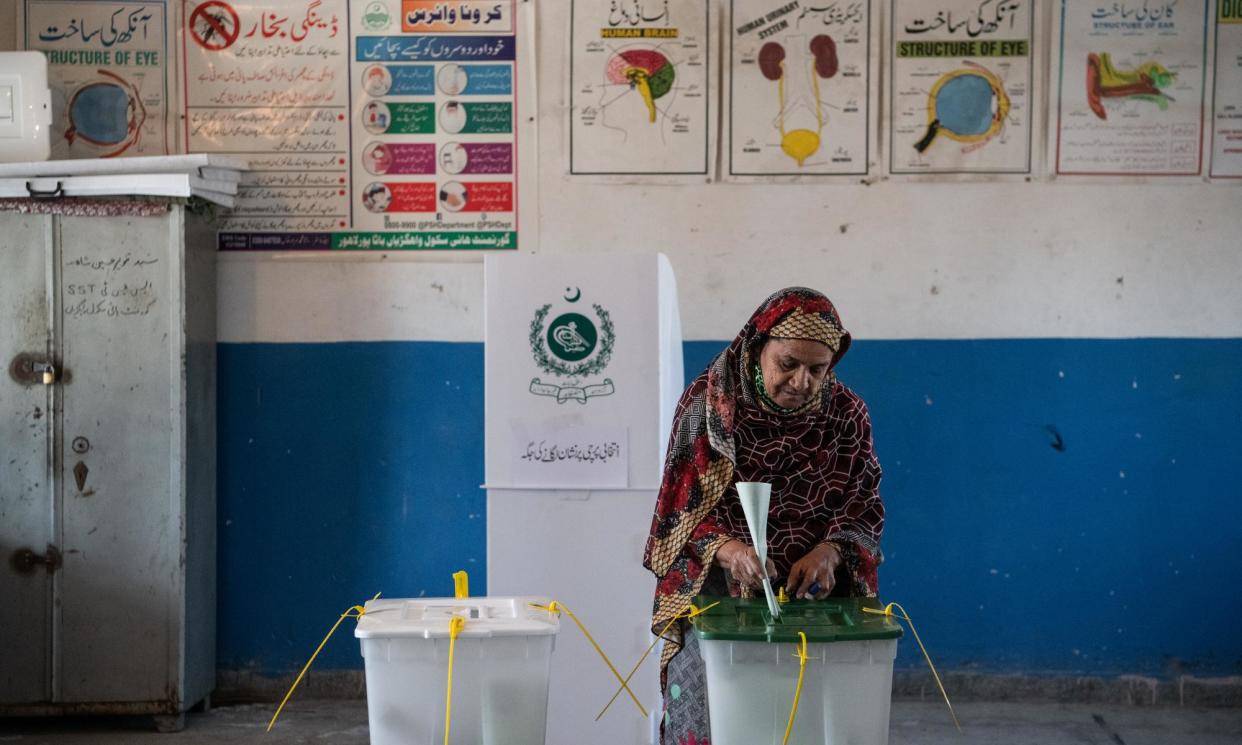Imran Khan claims victory in Pakistan poll but military might have final say

Imran Khan’s political party has declared it intends to form the next government after claiming a shock election victory, despite efforts by the opposition to take power in a backroom coalition deal.
Even as results showed that candidates backed by Pakistan Tehreek-e-Insaf (PTI), the party run by the incarcerated former prime minister Khan, had won the most seats, by Saturday night there was still little clarity on who would be forming the next government in Pakistan, adding to a climate of political turmoil.
Speaking to the Observer in Islamabad, the PTI party chairman, Gohar Ali Khan, emphasised the party’s intention to form the government, despite many obstacles in its path. While candidates affiliated with PTI won the most national assembly seats, it was not enough to claim a simple majority in parliament. Meanwhile, Imran Khan – their leader and choice for prime minister – is serving more than a decade in jail.
“The results are clear: we are the majority party and we’re going to be forming the government,” said Ali Khan. “Common sense must prevail. The people have spoken and they have given us the mandate to form the government. That needs to be respected before they come out on the street, even if we ask them not to.”
He added: “The people have spoken, they want Pakistan to be independent, to be democratic.”
However, Ali Khan conceded that PTI faced “a tough situation”. While, officially, PTI candidates won more than 90 seats, this is many short of the 170 needed for an overall majority.
The party says the true number won by PTI is 154 seats, but dozens were taken away in alleged widespread vote rigging and manipulation, which it is now contesting with the election commission. The US, UK and EU had raised concerns over the alleged extensive tampering of votes.
On Saturday night the Pakistani newspaper Dawn said that PTI had won 93 of 264 seats being contested, 20 more than its nearest rivals Pakistan Muslim League-Nawaz (PML-N) on 73. Eight seats were still undeclared.
Ali Khan described PTI’s efforts to form a government as “a race against time” as Pakistan’s own so-called game of thrones had begun: the two other main parties, PML-N and Pakistan People’s party (PPP), met on Friday night and again on Saturday to discuss forming a coalition with other smaller parties, to gain a majority to keep PTI out of power.
Both are seen as legacy parties, run by two of Pakistan’s most powerful political dynasties – the Sharif family and the Bhutto family – who have held power at different times over generations.
Khurram Dastgir Khan, a senior figure in PML-N and a former federal minister, said: “We will form a government but the complete coalition has yet to be decided.” Both sides confirmed there had been no discussions to join with PTI. Analysts said it could be days more of political horse-trading before the largest party, or coalition, is agreed and invited by the president to form the government.
It had widely been assumed that Nawaz Sharif, three-time former prime minister and the head of PML-N, would be the next prime minister after he seemed to have been given the tacit backing of Pakistan’s influential military establishment. The army is widely described as the country’s political power broker and has shaped election outcomes for decades, as well as ruling directly after seizing power in four coups.
Before the election, it had been made very clear that the military leadership would do everything to prevent Khan’s party regaining power. Khan was elected in 2018 with the backing of the military, which was seen to influence his government, but the generals helped orchestrate his fall after their alliance fell apart.
Ali Khan said that the “establishment” – a common term to mean the military – was the “driving force behind everything”.
“They probably had it all decided before the election, but I don’t think they expected us to get as much support as we got from the people,” he said. He said he had now directly asked the “prime institution” – another euphemism for the military – to “accept the people’s mandate”.
Ali Khan said PTI stood firm on its message that “the establishment has to stay out of politics”. “They must not be interfering in the political arena. They must not be forming the government. This must stop now,” he said.
Nonetheless, the silent hand of the military was still seen to be at play in the election outcome.
While Sharif appeared to have been brought back from political exile after a “backroom deal” with the army leadership, his history with the military is a turbulent one. All three of his past terms ended after he challenged its power.
Related: Imran Khan allies claim shock victory in Pakistan election despite crackdown
Analysts and those within his party said that the election results, and the weak and unwieldy coalition government that now looks likely to come to power, served the military’s agenda, ensuring there was no challenge to their political and business interests.
According to those around Sharif, he took the election results as a “significant betrayal”. Many believe that if a deal is agreed with coalition partners, his younger brother Shehbaz Sharif might become prime minister instead.
“I think Nawaz Sharif’s desire to be given a majority in the parliament raised suspicion in the military establishment. They feared the old defiant Nawaz Sharif coming back, so wanted to put him in his place,” said a senior PML-N leader.
Tahir Naeem Malik, a political analyst, took a very similar view. “I think these results will satisfy the military,” he said. “It suits them if society is divided and polarised. They control through repression, so a hung parliament benefits those who control power.Their space in the political arena remains safe and unchallenged as ever.”


